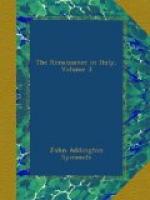Now, for that every stroke
excels the more
The closer to
the forge it still ascend,
Her soul that
quickened mine hath sought the skies:
Wherefore I find my toil will
never end,
If God, the great
artificer, denies
That tool which
was my only aid before.
The next is peculiarly valuable, as proving with what intense and religious fervour Michael Angelo addressed himself to the worship of intellectual beauty. He alone, in that age of sensuality and animalism, pierced through the form of flesh and sought the divine idea it imprisoned:[423]—
PER RITORNAR LA
As one who will reseek her
home of light,
Thy form immortal
to this prison-house
Descended, like
an angel piteous,
To heal all hearts and make
the whole world bright.
’Tis this that thralls
my heart in love’s delight,
Not thy clear
face of beauty glorious;
For he who harbours
virtue, still will choose
To love what neither years
nor death can blight.
So fares it ever with things
high and rare,
Wrought in the
sweat of nature; heaven above
Showers on their
birth the blessings of her prime;
Nor hath God deigned to show
Himself elsewhere
More clearly than
in human forms sublime;
Which, since they
image Him, compel my love.
The same Platonic theme is slightly varied in the two following sonnets:[424]—
SPIRTO BEN NATO
Choice soul, in whom, as in
a glass, we see,
Mirrored in thy
pure form and delicate,
What beauties
heaven and nature can create,
The paragon of all their works
to be!
Fair soul, in whom love, pity,
piety,
Have found a home,
as from thy outward state
We clearly read,
and are so rare and great
That they adorn none other
like to thee!
Love takes me captive; beauty
binds my soul;
Pity and mercy
with their gentle eyes
Wake in my heart
a hope that cannot cheat.
What law, what destiny, what
fell control,
What cruelty,
or late or soon, denies
That death should
spare perfection so complete?
DAI DOLCE PIANTO
From sweet laments to bitter
joys, from peace
Eternal to a brief
and hollow truce,
How have I fallen!—when
’tis truth we lose,
Mere sense survives our reason’s
dear decease.
I know not if my heart bred
this disease,
That still more
pleasing grows with growing use;
Or else thy face,
thine eyes, in which the hues
And fires of Paradise dart
ecstasies.
Thy beauty is no mortal thing;
’twas sent
From heaven on
high to make our earth divine:
Wherefore, though
wasting, burning, I’m content;
For in thy sight what could
I do but pine?
If God Himself
thus rules my destiny,
Who, when I die,
can lay the blame on thee?




